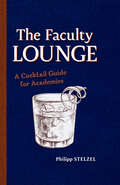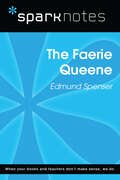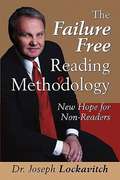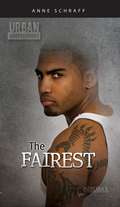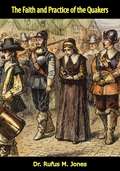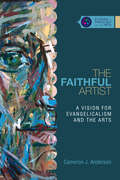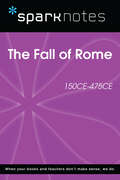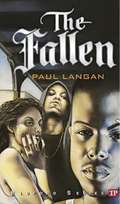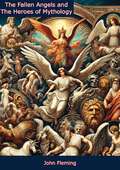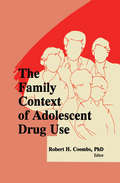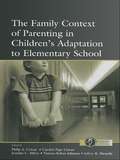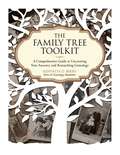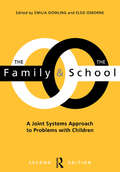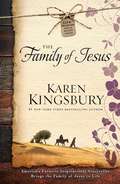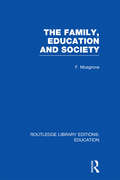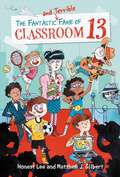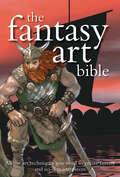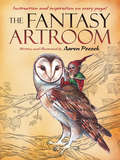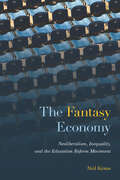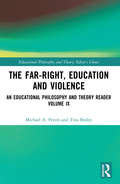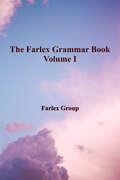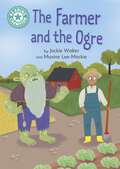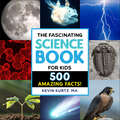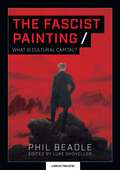- Table View
- List View
The Faculty Lounge: A Cocktail Guide for Academics
by Philipp StelzelOffering cocktails for every academic occasion along with spirited, amusing commentary, The Faculty Lounge is the perfect gift for graduate students, tenure-track professors, and disillusioned administrators.
The Faerie Queen (SparkNotes Literature Guide Series)
by SparkNotesThe Faerie Queen (SparkNotes Literature Guide) by Edmund Spenser Making the reading experience fun! Created by Harvard students for students everywhere, SparkNotes is a new breed of study guide: smarter, better, faster.Geared to what today's students need to know, SparkNotes provides:chapter-by-chapter analysis explanations of key themes, motifs, and symbols a review quiz and essay topics Lively and accessible, these guides are perfect for late-night studying and writing papers.
The Failure Free Reading Methodology: New Hope for Non-readers
by Joseph LockavitchThis book provides the insight into a new corrective reading action. The time has come to stop giving up on failing students and this book shows how.
The Fairest (Urban Underground #8)
by Anne SchraffAlonee's high school is holding a medieval fair where one junior will be crowned princess. Alonee is concerned when the selection process turns into a dramatic popularity contest where girls go to great lenghths to win.
The Faith and Practice of the Quakers
by Rufus M. JonesPerhaps no religious group enjoys such wholehearted esteem as the Society of Friends. Ever since their founding, the Quakers have proved a stimulating and inspiriting force in the Christian Church. Standing for Jesus’ program for world peace, practicing non-resistance, and performing miracles of mercy and relief in a world of hatred, they have achieved a position almost unique in Christendom. Their astonishing history is here told by one who is of all men most fitted for the task—Dr. Rufus M. Jones, one of the founders of the American Friends Service Committee and one of the most influential Quakers of the 20th century.
The Faithful Artist: A Vision for Evangelicalism and the Arts (Studies in Theology and the Arts #Coming In August)
by Cameron J. AndersonThe tension between Christianity and the arts is often real. But it also offers a false dichotomy. Many Christian artists think that they must choose between their faith and their artistic calling. Drawing upon his experiences as both a Christian and a practicing artist, Cameron J. Anderson explores the dynamics of faith and art in this latest volume in IVP Academic?s Studies in Theology and the Arts series. Tracing the relationship between evangelicalism and modern art in postwar America—two entities that often found themselves at odds with each other—Anderson raises several issues that confront artists. With skill, sensitivity and insight, he considers questions such as the role of our bodies and our senses in our experience of the arts, the relationship between text and image, the persistent dangers of idolatry, the possibility of pursuing God through an encounter with beauty and more. Throughout this study, Anderson's principal concern is how Christian artists can faithfully pursue their vocational calling in contemporary culture. Readers will find here not only an informed and thoughtful response, but also a vision that offers guidance and hope.
The Fall of Rome (SparkNotes History Notes)
by SparkNotesThe Fall of Rome (150 CE-475 CE) (SparkNotes History Note) Making the reading experience fun! SparkNotes History Guides help students strengthen their grasp of history by focusing on individual eras or episodes in U.S. or world history. Breaking history up into digestible lessons, the History Guides make it easier for students to see how events, figures, movements, and trends interrelate. SparkNotes History Guides are perfect for high school and college history classes, for students studying for History AP Test or SAT Subject Tests, and simply as general reference tools.Each note contains a general overview of historical context, a concise summary of events, lists of key people and terms, in-depth summary and analysis with timelines, study questions and suggested essay topics, and a 50-question review quiz.
The Fallen (Bluford Series #11)
by Paul Langan<P>Martin Luna's world is crumbling. <P>A fight threatens to end his sophomore year at Bluford High School. <P>But at home, things are even worse. <P>Frankie, the most feared homeboy from his neighborhood, is hunting him. <P>Alone and with time running out, Martin makes a desperate choice. <P>Will it save or destroy him?
The Fallen Angels and The Heroes of Mythology: The Sons Of God And The Mighty Men Of The Sixth Chapter Of The First Book Of Moses
by John Fleming“In the beginning, God created the Heavens and the earth. Soon thereafter, however, the harmonious communion that God intended for mankind to live within was interrupted by a sinister intervention from the enemy. As days turned into years, this ancient agenda of corruption continued to intertwine even more deeply with the human story affecting the very makeup of mankind. And it came to pass, when men began to multiply on the face of the earth, and daughters were born unto them. That the sons of God saw the daughters of men that they were fair; and they took them wives of all which they chose. Who were these sons of God, and daughters of men? This and many parallel questions are what author Rev. John Fleming researched and addressed nearly a century and a half ago in this thorough, antiquarian work. Finally, this extensive work is available to the main-stream collector, who may again access these ancient writings, gaining the ability to:*Understand what scripture is really telling us about the genetic trend taking place in Genesis 6 when it says: And the Lord said, My spirit shall not always strive with man, for that he also is flesh: yet his days shall be an hundred and twenty years*Explore who the Sons of God and daughters of men really were according to the ancient writings that trace these key phrases back to their original Greek and Hebrew translation.*Compare popular theories using Flemings concise, thorough review of many differing concepts and interpretations of these scriptures as construed through Greek mythology, Mendelssohn’s View, the Jewish or Filii Magnatum Interpretation, the Sethite Interpretation, and the Angel Interpretation.”-Print ed.
The Family Context of Adolescent Drug Use
by Robert H. CoombsHere is an essential volume for educators, social workers, health care professionals, and parents who are frustrated by the consuming power of drugs over the lives of young people and looking for answers to this enormous problem. In this unique and highly practical volume, experts concentrate on the family--the foundation of mental health and social control--as the most positive force in the prevention of adolescent drug use. Despite the “war on drugs,” young people in large numbers continue to use substances. This instructive guide focuses on educating and strengthening families--which makes stronger children who are less likely to use drugs--instead of the traditional efforts based on rehabilitation instead of prevention. It offers instructive background information about societal forces that affect families and make it difficult to raise drug-free youngsters. Family differences are discussed, such as family structure, parenting styles, ethnic and cultural characteristics. Contributors thoroughly examine practical, effective interventions--at home, at school, and with peers--that are positive rather than negative, instructional rather than punitive, and preventive instead of remedial.
The Family Context of Parenting in Children's Adaptation to Elementary School (Monographs in Parenting Series)
by Philip A. Cowan Carolyn Pape Cowan Jennifer C. Ablow Vanessa Kahen Johnson Jeffrey R. MeaselleThe Family Context of Parenting in Children's Adaptation to Elementary School is a result of a longitudinal prevention study of 100 families begun the year before their first children entered kindergarten. Each family went through an assessment and then a subset was randomly chosen for group intervention. The children in both groups were then studied as they progressed through kindergarten and first grade to assess the quality of their adaptation to the school environment.The text focuses on how parent-child relationships are only one determinant of a child's academic competence, social competence, and behavior. Rather, these relationships must be understood in the context of the role they play within the family as a system. It also addresses the recent challenges to claims about the impact of parents on their children's development.The book sheds additional light on family influences within the larger social environment as a key determinant of the quality of children's adjustment to schooling. It appeals to scientists, professionals, and parents alike.
The Family Tree Toolkit: A Comprehensive Guide to Uncovering Your Ancestry and Researching Genealogy
by Kenyata D. BerryThe popularity of Family History has increased over the past five years due to TV shows like Genealogy Roadshow, Finding Your Roots, and Who Do You Think You Are? The ability to access records online has opened up the one time hobby for genealogy enthusiasts to the mainstream. Companies like Ancestry.com, Familysearch.org, Findmypast.com, and MyHeritage have spent millions of dollars making records available around the world. DNA technology continues to evolve and provides the instant gratification that we have become use to as a society. But then the question remains, what does that really mean? Knowing your ancestry is more than just ethnic percentages it’s about creating and building a story about your family history. The Family History Toolkit is designed to help you navigate the sometimes overwhelming and sometimes treacherous waters of finding your ancestors. While this is not a comprehensive guide to all things genealogy, it is a roadmap to help you on this journey of discovery, whether you are looking for your African Asian, European, or Jewish ancestry. The Family History Toolkit guides you on how and where to begin, what records are available both online and in repositories, what to do once you find the information, how to share your story and of course DNA discoveries.
The Family and the School: A Joint Systems Aproach to Problems with Children
by Emilia Dowling Elsie OsborneThis edition has been revised and updated to include more material specifically related to work with schools. It reflects the major changes in society, in legislation and in the nature of the interaction between families and the education system in the last decade. The contributors all have links with the Child and Family Department of the Tavistock Clinic and include educational psychologists working with schools and hospitals, family therapists, child and family psychiatrists and teachers.
The Family of Jesus: Bible Study (Life-Changing Bible Study Series #1)
by Karen KingsburyAmerica's favorite inspirational novelist offers a fictional view of six of the family members of Jesus, all anchored by Scriptural truth, creating a life-changing and unprecedented emotional connection to the Bible.Through The Family of Jesus, readers will develop an emotional connection to the family members of Jesus, learning about their lives and falling in love with Scripture along the way. Bible studies and devotionals abound, and in churches everywhere people gather to seek a deeper understanding of God's word and its application to their lives. But too often these studies engage only the analytic approach to Bible learning. In The Family of Jesus, #1 New York Times bestselling novelist Karen Kingsbury will make you laugh, cry, and ultimately care more deeply about the Bible by helping you grasp the truths in Scripture not just with your mind, but with your heart. The characters in these short stories were among those closest to Jesus--Mary, Joseph, Jesus' brother James, John the Baptist, Zechariah, and Elizabeth. Each has a compelling tale to tell. Kingsbury intersperses fictional, emotionally gripping details anchored in Scripture with historical and theological insights and questions that will guide soul-searching and reflection. The Family of Jesus not only provides a deeper understanding of the relatives of our Savior, but also helps readers acquire tools that will draw them closer to Christ, to the Scriptures, and to each other.
The Family, Education and Society (Routledge Library Editions: Education)
by Frank MusgroveIn this provocative study the author challenges many contemporary assumptions about the modern family, the circumstances of home life which lead to academic success and the proper relationship between home and school. The modern family is not ‘in decline’; its history is a success story. It is stable, unsociable, emotionally potent. Over the past three centuries it has turned its back on society. It is less remarkable for rebellious children than for the remorseless pressures it can exert upon the young, particularly for ‘success’ in the school system. In the home-centred society the school is an extension of the home, created in its image. Academic success seems most certain when the ‘good home’ and the ‘good school’ form a determined alliance. The combined pressures of home and school often seem to produce withdrawn, self-disparaging and negative young men and women. The author argues that the good school must counter-act many of the influences of the good home and that the educational system must re-order its affairs so that it is able to encourage and assess achievement which comes from joy rather than neurotic drive.
The Fantastic and Terrible Fame of Classroom 13 (Classroom 13 #3)
by Joelle Dreidemy Honest Lee Matthew J. GilbertFor fans of Captain Underpants or Sideways Stories from Wayside School, this new chapter book series is perfect for reluctant readers.When famous agent Lucy LaRoux drops by Classroom 13, she makes an offer no one can refuse--she makes all of the students FAMOUS. You might think this was sweet, but it was not. It was selfish. (Lucy wants their money.) With great fame comes frightening stage fright, broken bones, rotten reality television, and other awful accidents. As the students of Classroom 13 are about to learn, being famous (or infamous) isn't always fun. What do YOU want to be famous for? The final chapter of each book encourages young readers to write their OWN chapter and send it in to the author, Honest Lee. The Fantastic and Terrible Fame of Classroom 13 is the third title in a new chapter book series of hilarious stories about a very unlucky classroom. Each story is full of humor, action, and fun that will prompt hours of conversation among friends, families, and classrooms.(Psst! Hey you. Yeah, YOU! Just between us, this book also has a secret code hidden in every book that kids will have to figure out to read a chapter. Kids'll love it!) ©2017 by Hachette Book Group, Inc.
The Fantasy Art Bible (Artist's Bibles Ser.)
by Quarto Publishing GroupA guide to drawing and coloring fantasy and science fiction art, with techniques and tools to bring your ideas to life.With photographs, illustrations and diagrams, The Fantasy Art Bible makes the learning process simple and fun for beginners and provides useful tips for more advanced readers. With a thorough description of the tools and techniques used in fantasy and science fiction drawing, painting, and digital design, this book is a must-have for anyone who desires to transfer the characters and settings in their imagination onto paper or canvas. Instructions show readers how to use pencils, graphite, charcoal, conte, colored pencils, inks, pens, markers, inks, watercolors, and paints, any style of artist can find guidance and detailed advice in this book. Drawing concepts and inspirational images like swords, sorcery, dragons and beasts will hold the interest of any artist. Tips on drawing anatomy and using body language and anthropomorphic qualities will help readers challenge their creativity to draw amazing fantasy and science fiction artwork.
The Fantasy Artroom
by Aaron Pocock"A wonderful addition to any beginning or intermediate artist's library, not only those interested in fantasy. It's thoughtful, detailed, and filled with explanations of vocabulary terms and drawing materials, both in describing what they are and how they're used." -- BECL Book ReviewsDo you love to create imaginative artwork? Would you like to add depth and richness to your creations? Could you use fresh inspiration? Here is the book that will help you brush up on your skills and add new tricks and techniques to your repertoire. Sketching, line art, watercolors, mixed media, composition, rendering methods - The Fantasy Artroom is your all-in-one traveling companion into the world of fantasy art.These step-by-step demonstrations offer easy-to-follow methods for drawing trees and landscapes; forming dwarves, witches, mermaids, centaurs, and other characters; and putting them all together into enchanting compositions. Introduce a new dimension to your drawing, line art, and watercolor images with this richly illustrated guide and its helpful exercises, tips, and suggestions."This book is magical!" -- The Sheepish Reader 'n' Writer
The Fantasy Economy: Neoliberalism, Inequality, and the Education Reform Movement
by Neil KrausWage stagnation, growing inequality, and even poverty itself have resulted from decades of neoliberal decision making, not the education system, writes Neil Kraus in his urgent call to action, The Fantasy Economy. Kraus claims the idea that both the education system and labor force are chronically deficient was aggressively and incorrectly promoted starting in the Reagan era, when corporate interests and education reformers emphasized education as the exclusive mechanism providing the citizenry with economic opportunity. However, as this critical book reveals, that is a misleading articulation of the economy and education system rooted in the economic self-interests of corporations and the wealthy. The Fantasy Economy challenges the basic assumptions of the education reform movement of the last few decades. Kraus insists that education cannot control the labor market and unreliable corporate narratives fuel this misinformation. Moreover, misguided public policies, such as accountability and school choice, along with an emphasis on workforce development and STEM over broad-based liberal arts education, have only produced greater inequality. Ultimately, The Fantasy Economy argues that education should be understood as a social necessity, not an engine of the neoliberal agenda. Kraus’ book advocates for a change in conventional thinking about economic opportunity and the purpose of education in a democracy.
The Far-Right, Education and Violence: An Educational Philosophy and Theory Reader Volume IX (Educational Philosophy and Theory: Editor’s Choice)
by Michael A. Peters Tina BesleyIn the last decade the far-right, associated with white nationalism, identitarian politics, and nativist ideologies, has established itself as a major political force in the West, making substantial electoral gains across Europe, the USA, and Latin America, and coalescing with the populist movements of Trump, Brexit, and Boris Johnson’s 2019 election in the UK. This political shift represents a major new political force in the West that has rolled back the liberal internationalism that developed after WWI and shaped world institutions, globalization, and neoliberalism. It has also impacted upon the democracies of the West. Its historical origins date from the rise of fascism in Italy, Germany, and Austria from the 1920s. In broad philosophical terms, the movement can be conceived as a reaction against the rationalism and individualism of liberal democratic societies, and a political revolt based on the philosophies of Nietzsche, Darwin, and Bergson that purportedly embraced irrationalism, subjectivism, and vitalism. This edited collection of essays by Michael A Peters and Tina Besley, taken from the journal Educational Philosophy and Theory, provides a philosophical discussion of the rise of the far-right and uses it as a canvas to understand the return of fascism, white supremacism, acts of terrorism, and related events, including the refugee crisis, the rise of authoritarian populism, the crisis of international education, and Trump’s ‘end of globalism’.
The Farlex Grammar Book Volume I Complete English Grammar Rules: Examples, Exceptions, Exercises, and Everything You Need to Master Proper Grammar (The\farlex Grammar Book Ser.)
by Farlex InternationalFarlex brings you the most comprehensive grammar guide yet: all the rules of English grammar, explained in simple, easy-to-understand terms. Over 500 pages of proper grammar instruction—2X more than the leading grammar book! Whether you're an expert or a beginner, there's always something new to learn when it comes to the always-evolving English language. Don't rely on multiple incomplete textbooks that contradict each other—fill in all the gaps in your grammar knowledge with one go-to guide. Only this book gives you key exceptions, common grammar mistakes, thousands of real-world examples, and hundreds of grammar quizzes designed to help you retain what you've learned. With this book, you'll be able to: Quickly master basic English grammar and tackle more advanced topics. Properly use every type of noun, verb, and even the most obscure grammar elements. Master verb tenses, including irregular verbs and exceptions. Avoid embarrassing grammar errors. Immediately put your skills into action! Become a more effective writer and communicator in school, at work, and in everyday conversation.
The Farmer and the Ogre: Independent Reading Turquoise 7 (Reading Champion #1076)
by Jackie WalterIn this Scandinavian traditional tale, a greedy ogre demands the farmer's crops. Can the farmer think of a way to trick him?This story is part of Reading Champion, a series carefully linked to book bands to encourage independent reading skills, developed with Dr Sue Bodman and Glen Franklin of UCL Institute of Education (IOE)Reading Champion offers independent reading books for children to practise and reinforce their developing reading skills.Fantastic stories are accompanied by engaging artwork and a reading activity. Each book has been carefully graded so that it can be matched to a child's reading ability, encouraging reading for pleasure.
The Fascinating Science Book for Kids: 500 Amazing Facts! (Fascinating Facts)
by Kevin KurtzDiscover 500 fascinating facts about everything from astronomy to zoology in this amazing science book for kids age 9 to 12!Do you love dinosaurs and dolphins, mountains and meteors? The Fascinating Science Book for Kids has all of that and more! This trivia-packed book includes 500 stupendous science facts that offer hours of exploration. Alongside full-color pictures on every page, you'll find weird and wonderful facts about topics like prehistoric life, the deep sea, weather, minerals, the human body, the solar system—and even your own backyard!In this engaging book of science fun facts for kids, you'll learn amazing things like:Scientists have evidence that tiny diamonds sometimes fall from the sky on Neptune.The giant squid has a brain shaped like a donut.Some bacteria species generate electricity when they breathe and can even power a battery.Get a heaping helping of the science facts kids love with The Fascinating Science Book for Kids — one of the best in kids' educational books!
The Fascist Painting: What is Cultural Capital?
by Phil BeadleThe Fascist Painting is a serious, rich and deeply intelligent piece of work that will radically alter the way we view culture in schools and will be a key text for anyone designing a curriculum. The Ofsted Inspection Framework states that cultural capital is 'The essential knowledge that pupils need to be educated citizens' and that schools 'should be introducing [students] to the best that has been thought and said and helping to engender an appreciation of human creativity and achievement'. They are now considering, 'the extent to which schools are equipping pupils with the knowledge and cultural capital they need to succeed in life.' But what does this term mean? And how are schools to respond to this? In this densely argued and wide-ranging text, Phil Beadle answers those questions and many more by using the work of Pierre Bourdieu to prompt a discussion of how we improve the provision of cultural capital in our schools. Where does the best that has been thought and said come from? Why is the government importing the unexamined language of the private school into the state sector? What is the real purpose behind character education? Does sport, as is reputed, teach resilience, and why would anyone think it was appropriate to teach children a quality they already have? Is cultural capital just ruling class culture? Chiefly, does using a term originated by a French intellectual and radical sociologist to instate the culture of the rich as being superior prove anything other more than a complete absence of thought, or have they accidentally given us a radical tool to change education for the better?
The Fascist Painting: What is Cultural Capital?
by Phil BeadleThe Fascist Painting is a serious, rich and deeply intelligent piece of work that will radically alter the way we view culture in schools and will be a key text for anyone designing a curriculum. The Ofsted Inspection Framework states that cultural capital is 'The essential knowledge that pupils need to be educated citizens' and that schools 'should be introducing [students] to the best that has been thought and said and helping to engender an appreciation of human creativity and achievement'. They are now considering, 'the extent to which schools are equipping pupils with the knowledge and cultural capital they need to succeed in life.' But what does this term mean? And how are schools to respond to this? In this densely argued and wide-ranging text, Phil Beadle answers those questions and many more by using the work of Pierre Bourdieu to prompt a discussion of how we improve the provision of cultural capital in our schools. Where does the best that has been thought and said come from? Why is the government importing the unexamined language of the private school into the state sector? What is the real purpose behind character education? Does sport, as is reputed, teach resilience, and why would anyone think it was appropriate to teach children a quality they already have? Is cultural capital just ruling class culture? Chiefly, does using a term originated by a French intellectual and radical sociologist to instate the culture of the rich as being superior prove anything other more than a complete absence of thought, or have they accidentally given us a radical tool to change education for the better?
